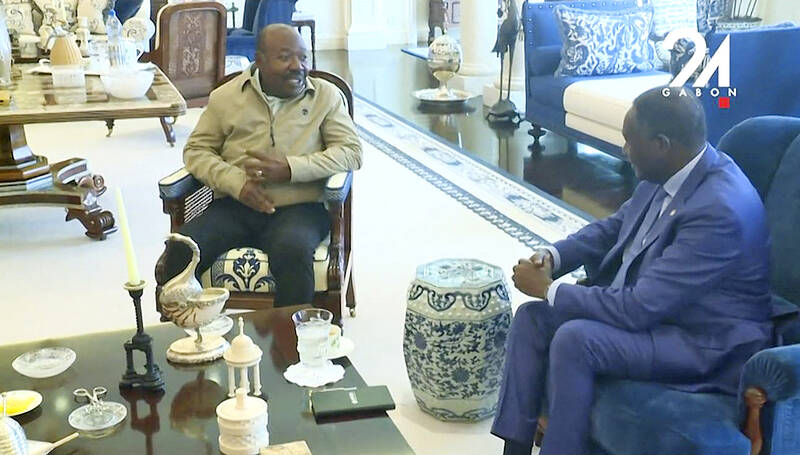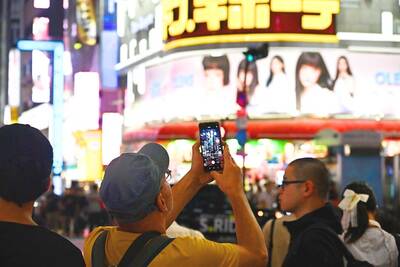A UN representative told Gabon’s military leader that UN institutions stood ready to support the country as it transitions back to constitutional order following a coup that ended the Bongo family’s 56 years of dynastic autocracy.
Army officers seized power on Aug. 30, annulling an election minutes after an announcement that Gabonese President Ali Bongo had won, which they said was not credible. Bongo, in power since 2009, had succeeded his father, Omar Bongo, who ruled for 42 years.
The coup was greeted with scenes of jubilation in the capital, Libreville, and on Monday, Gabeonese General Brice Oligui Nguema was sworn in by judges as interim president, promising free and fair elections, but giving no timetable for organizing them.

Photo: AFP
Abdou Abarry, special representative of the UN Secretary-General in Central Africa, met Nguema in Libreville on Wednesday and told him that the UN would assist the country as it made a fresh start.
“Once we know the roadmap, the timetable, once a government will have been appointed, our different agencies will make the necessary contacts and continue to support Gabon,” he said after the meeting, in remarks broadcast on Gabon 24 TV.
The coup in Gabon, an oil-producing country of 2.3 million, was the eighth in three years in West and Central Africa, though it has been playing out very differently from the most recent other army takeover, in Niger.
Unlike Niger, Gabon has not seen an outpouring of anti-French, pro-Russian sentiment, and the generals in charge in Libreville have appeared open to dialogue with international organizations, which their counterparts in Niamey have shunned.
The Economic Community of Central African States on Monday suspended Gabon, but sent Central African Republic President Faustin-Archange Touadera as its representative to meet Nguema.
Touadera told reporters he had also met Ali Bongo, with Nguema’s permission. He did not disclose any details about Ali Bongo’s circumstances or state of mind, saying only that the meeting had been fruitful.
Ali Bongo had been under house arrest after the coup, but the junta said in a statement on Wednesday that he was now free and could travel abroad for medical checks if he so wished.

BRUSHED OFF: An ambassador to Australia previously said that Beijing does not see a reason to apologize for its naval exercises and military maneuvers in international areas China set off alarm bells in New Zealand when it dispatched powerful warships on unprecedented missions in the South Pacific without explanation, military documents showed. Beijing has spent years expanding its reach in the southern Pacific Ocean, courting island nations with new hospitals, freshly paved roads and generous offers of climate aid. However, these diplomatic efforts have increasingly been accompanied by more overt displays of military power. Three Chinese warships sailed the Tasman Sea between Australia and New Zealand in February, the first time such a task group had been sighted in those waters. “We have never seen vessels with this capability

A Japanese city would urge all smartphone users to limit screen time to two hours a day outside work or school under a proposed ordinance that includes no penalties. The limit — which would be recommended for all residents in Toyoake City — would not be binding and there would be no penalties incurred for higher usage, the draft ordinance showed. The proposal aims “to prevent excessive use of devices causing physical and mental health issues... including sleep problems,” Mayor Masafumi Koki said yesterday. The draft urges elementary-school students to avoid smartphones after 9pm, and junior-high students and older are advised not

Philippine President Ferdinand Marcos Jr has fired his national police chief, who gained attention for leading the separate arrests of former Philippine president Rodrigo Duterte on orders of the International Criminal Court and televangelist Apollo Carreon Quiboloy, who is on the FBI’s most-wanted list for alleged child sex trafficking. Philippine Executive Secretary Lucas Bersamin did not cite a reason for the removal of General Nicolas Torre as head of the 232,000-member national police force, a position he was appointed to by Marcos in May and which he would have held until 2027. He was replaced by another senior police general, Jose

POWER CONFLICT: The US president threatened to deploy National Guards in Baltimore. US media reports said he is also planning to station troops in Chicago US President Donald Trump on Sunday threatened to deploy National Guard troops to yet another Democratic stronghold, the Maryland city of Baltimore, as he seeks to expand his crackdown on crime and immigration. The Republican’s latest online rant about an “out of control, crime-ridden” city comes as Democratic state leaders — including Maryland Governor Wes Moore — line up to berate Trump on a high-profile political stage. Trump this month deployed the National Guard to the streets of Washington, in a widely criticized show of force the president said amounts to a federal takeover of US capital policing. The Guard began carrying